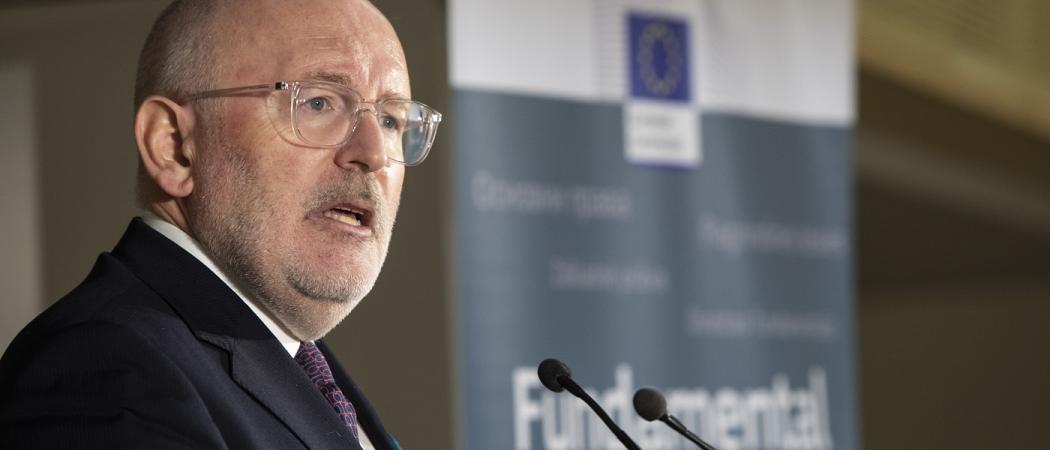Frans Timmermans joined MEPs in pressing Hungary over threats to academic freedom and the rule of law

Frans Timmermans. Photo: European Commission
EU vice president Frans Timmermans reiterated the Commission’s concerns over the erosion of academic freedom in Hungary during this week’s plenary debate in the European Parliament, telling MEPs, “Having a university forced to leave an EU member state because of government measures and systematic pressure is unprecedented in the history of the European Union.”
Timmermans said “it is sad and very worrying” that Hungary can continue eroding the rule of law and limiting academic freedom, despite EU infringement procedures and clear warnings from stakeholders.
MEPs echoed the concerns and called for stronger response from the EU Council, to speed up the debate on Hungary’s case.
Hungarian MEP Tibor Szanyi said “Knowledge is no longer worth anything [in Hungary] and the situation continues to get worse.”
If it were to apply for EU membership again, “Hungary would not be accepted,” said Luxembourgish MEP Christophe Hansen. “It’s the first member state to expel a European academic institution.”
In September last year, following the publication of a damning report by Dutch MEP Judith Sargentini, the European Parliament voted to trigger article 7 against Hungary on a charge of eroding core democratic values. The move could ultimately lead to Budapest losing its right to vote on EU decisions, but to date, the Council has not set an agenda for debating the case.
The Commission has also referred Hungary’s infringements on academic freedom to the European Court of Justice, but the court has yet to discuss the issue.
Months after the parliament vote, Central European University announced in December that it is to move 80 per cent of its degree programmes from Budapest to Vienna, after the government passed a law stripping it of the right to issue US degrees in Hungary.
“Since the vote in September, things in Hungary have gotten worse,” said Sargentini, urging the current Romanian presidency of the Council “to come forward with timetable” and “start a real process.”
Romanian secretary of state for EU affairs Melania Ciot agreed to “keep the parliament informed on the next developments,” but failed to offer a more optimistic outlook. “We remain open to a pragmatic approach,” she said.
Following on from CEU’s decision to move, researchers at the Hungarian Academy of Sciences are worrying about their future, as the government is seeking more control over the research budget. It claims the academy’s network of research institutes needs to be restructured to boost excellence in research and innovation.
Frustrated MEPs
Austrian MEP Josef Weidenholzer said it is important there is an appropriate response from the Council and decried Hungary’s unwillingness to engage in the debate.
Hungarian prime minister Viktor Orban refused to join the plenary debate in Brussels. When asked by Science|Business for an explanation, the office of Zoltán Kovács, state secretary for international communications, pointed to a statement on a government website suggesting that European institutions are influenced by the agenda of philanthropist George Soros and called the parliament debate “campaign-season grandstanding”.
Beneath a large, and unflattering, photograph of Soros, the statement continued: “The European Parliament’s recent actions point in one, rather unfortunate direction: instead of representing the citizens of Europe, the pro-migration forces are increasingly pushing a policy that advances the Soros plan.” The Orbán regime has been trying to demonise Soros as its arch-enemy, for instance by plastering his face on menacing billboards at the last national elections.
"There's nothing, no new event, that justifies putting Hungary back on the [parliament's] agenda," said the government statement. “We put the will of Hungarian voters first and will always defend the national interest when necessary. But this debate, in fact, is not about Hungary or the rule of law in Hungary, so we will not dignify with our participation what is simply a pro-migration campaign event.”
“Hungary has become a façade of a democracy. Academic freedoms are under threat,” said Weidenholzer.
Polish MEP Barbara Kudrycka said that in, “throwing out a very good university out of the country” the Hungarian government proved the “situation is getting worse.”
More action needed in the Council
MEPs also urged the Council to speed up the debate on Hungary. “It is surprising that the council has not taken serious steps to move closer to the parliament’s resolution,” said Weidenholzer.
Hansen echoed that view and accused the Council of “complicity” with the Hungarian government for delaying a decision that would enforce a, “financial backstop to uphold fundamental values.”
“How much longer we will have to wait for you to trigger article 7?” Hansen asked.
According to Timmermans, the commission is determined to continue to make use of infringement procedures, but the ball is in the court of the EU Council. “Council now has all the key elements to start with the assessment of all issues raised,” he said.





 A unique international forum for public research organisations and companies to connect their external engagement with strategic interests around their R&D system.
A unique international forum for public research organisations and companies to connect their external engagement with strategic interests around their R&D system.